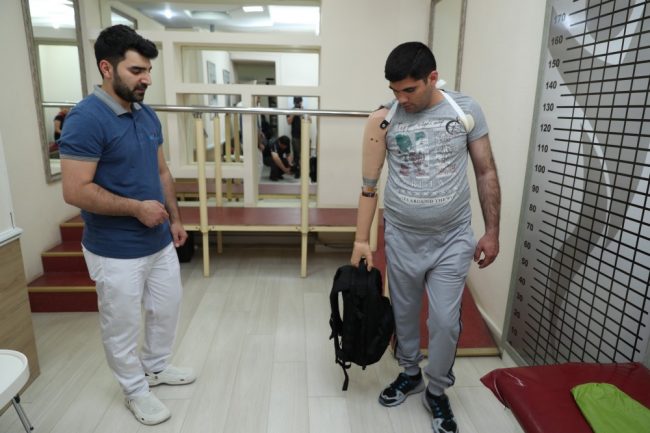
Another group of Azerbaijani soldiers and officers who became disabled in the Karabakh war have been supplied with high-tech prostheses under the aegis of the Heydar Aliyev Foundation.
These high-tech prostheses were chosen after careful examination of individual needs of the soldiers and officers who lost parts of their body in the battles in Karabakh.
According to the Heydar Aliyev Foundation, six of the disabled were supplied with Harmony P3 vacuum system, one person with Hybrid microprocessor controlled transfemoral prosthesis, and three servicemen with Bebionic3 prosthetic hand.
The orthopaedic devices supplied to the disabled soldiers and officers are:
Harmony P3 vacuum system
Produced by Otto Bock, Harmony P3 vacuum system does both, regulating the best possible fit of the residual limb in the prosthetic socket with a weight-activated mechanical vacuum pump.
Smaller and lighter than its predecessors, the Harmony P3 pump sets itself apart with a lightweight and slim design that is readily compatible with a visually appealing cosmetic cover and can be combined with various prosthetic feet. The mechanical Harmony pump is intended for users with a moderate to higher mobility grade.
Hybrid microprocessor controlled transfemoral prosthesis is produced by leading Japanese motion control technology manufacturer Nabtesco Corporation. The Hybrid knee features a highly accurate yielding function. Soft pneumatic control is added to the controlled power of the hydraulic system. This fusion of microprocessor controlled technologies gives patients a hybrid system that prevents unnerving buckling at the knee, and enables easier walking in greater comfort.
Bebionic3 prosthetic hand
Manufactured by RSL Steeper, debionic3 is the world’s most advanced prosthetic hand.
Sleek, elegant and cutting-edge in both design and technology, bebionic pushes the boundaries of multi-articulating myoelectric hands. As the world’s most lifelike, functional and easy to use myoelectric hand commercially available today, bebionic is comfortable, precise and intuitive for patients, transforming the lives and abilities of amputees around the world – from helping them perform simple tasks like tying shoelaces to giving them back their control and their pride.
At a meeting with a group of the disabled soldiers and officers last year, First Vice-President Mehriban Aliyeva gave instructions to supply them with artificial replacements for missing body parts to help them regain or maintain their mobility.
